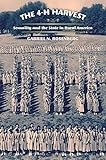The 4-H Harvest : Sexuality and the State in Rural America / Gabriel N. Rosenberg.
Material type: TextSeries: Politics and Culture in Modern AmericaPublisher: Philadelphia : University of Pennsylvania Press, [2015]Copyright date: ©2016Description: 1 online resource (304 p.) : 10 illusContent type:
TextSeries: Politics and Culture in Modern AmericaPublisher: Philadelphia : University of Pennsylvania Press, [2015]Copyright date: ©2016Description: 1 online resource (304 p.) : 10 illusContent type: - 9780812247534
- 9780812291896
- 630.6073 23
- online - DeGruyter
- Issued also in print.
| Item type | Current library | Call number | URL | Status | Notes | Barcode | |
|---|---|---|---|---|---|---|---|
 eBook
eBook
|
Biblioteca "Angelicum" Pont. Univ. S.Tommaso d'Aquino Nuvola online | online - DeGruyter (Browse shelf(Opens below)) | Online access | Not for loan (Accesso limitato) | Accesso per gli utenti autorizzati / Access for authorized users | (dgr)9780812291896 |
Browsing Biblioteca "Angelicum" Pont. Univ. S.Tommaso d'Aquino shelves, Shelving location: Nuvola online Close shelf browser (Hides shelf browser)

|

|

|

|

|

|

|
||
| online - DeGruyter Peripheral Desires : The German Discovery of Sex / | online - DeGruyter The Monster in the Garden : The Grotesque and the Gigantic in Renaissance Landscape Design / | online - DeGruyter Disknowledge : Literature, Alchemy, and the End of Humanism in Renaissance England / | online - DeGruyter The 4-H Harvest : Sexuality and the State in Rural America / | online - DeGruyter Poetical Dust : Poets' Corner and the Making of Britain / | online - DeGruyter Family Values and the Rise of the Christian Right / | online - DeGruyter Truth Commissions : Memory, Power, and Legitimacy / |
Frontmatter -- Contents -- List of Abbreviations -- Introduction. Signs of the State -- Chapter 1. Agrarian Futurism, Rural Degeneracy, and the Origins of 4-H -- Chapter 2. Financial Intimacy and Rural Manhood -- Chapter 3. 4-H Body Politics in the 1920s -- Chapter 4. Conserving Farm and Family in New Deal 4-H -- Chapter 5. Citizenship and Difference in Wartime 4-H -- Chapter 6. International 4-H in the Cold War -- Epilogue. Future Farmers of Afghanistan: Agrarian Futurism at the Twilight of Empire -- Notes -- Index -- Acknowledgments
restricted access online access with authorization star
http://purl.org/coar/access_right/c_16ec
4-H, the iconic rural youth program run by the U.S. Department of Agriculture, has enrolled more than 70 million Americans over the last century. As the first comprehensive history of the organization, The 4-H Harvest tracks 4-H from its origins in turn-of-the-century agricultural modernization efforts, through its role in the administration of federal programs during the New Deal and World War II, to its status as an instrument of international development in Cold War battlegrounds like Vietnam and Latin America.In domestic and global settings, 4-H's advocates dreamed of transforming rural economies, communities, and families. Organizers believed the clubs would bypass backward patriarchs reluctant to embrace modern farming techniques. In their place, 4-H would cultivate efficient, capital-intensive farms and convince rural people to trust federal expertise. The modern 4-H farm also featured gender-appropriate divisions of labor and produced healthy, robust children. To retain the economic potential of the "best" youth, clubs insinuated state agents at the heart of rural family life. By midcentury, the vision of healthy 4-H'ers on family farms advertised the attractiveness of the emerging agribusiness economy.With rigorous archival research, Gabriel N. Rosenberg provocatively argues that public acceptance of the political economy of agribusiness hinged on federal efforts to establish a modern rural society through effective farming technology and techniques as well as through carefully managed gender roles, procreation, and sexuality. The 4-H Harvest shows how 4-H, like the countryside it often symbolizes, is the product of the modernist ambition to efficiently govern rural economies, landscapes, and populations.
Issued also in print.
Mode of access: Internet via World Wide Web.
In English.
Description based on online resource; title from PDF title page (publisher's Web site, viewed 30. Aug 2021)


